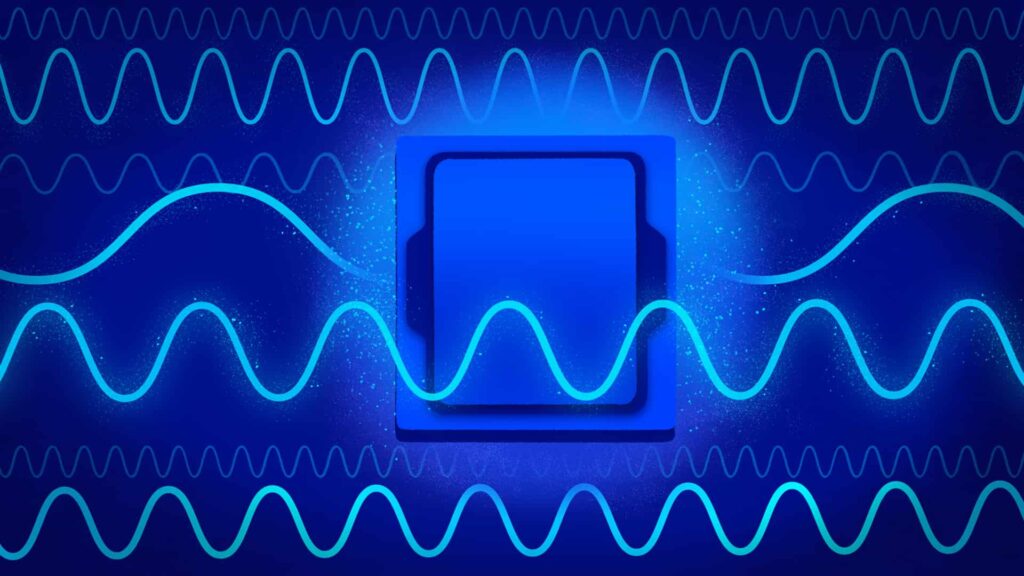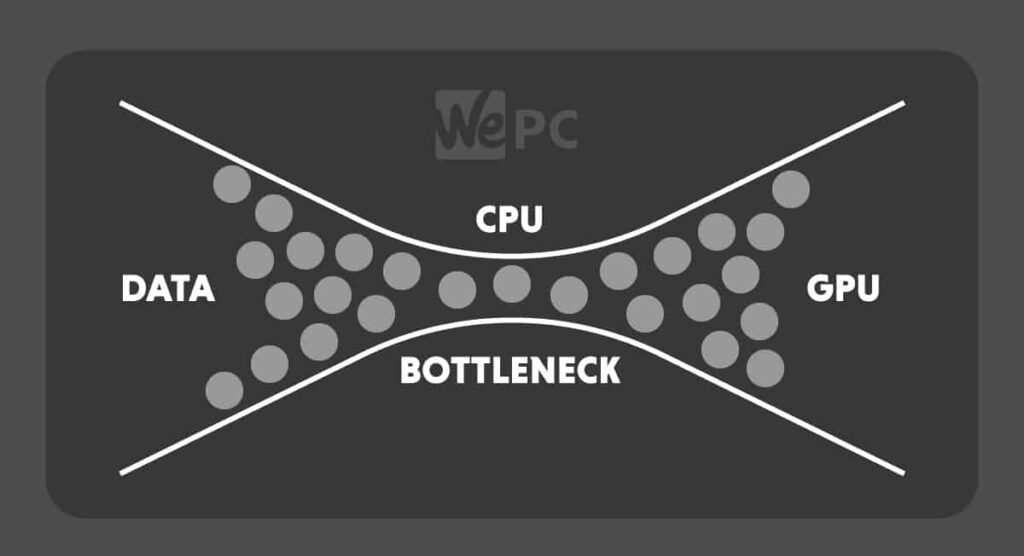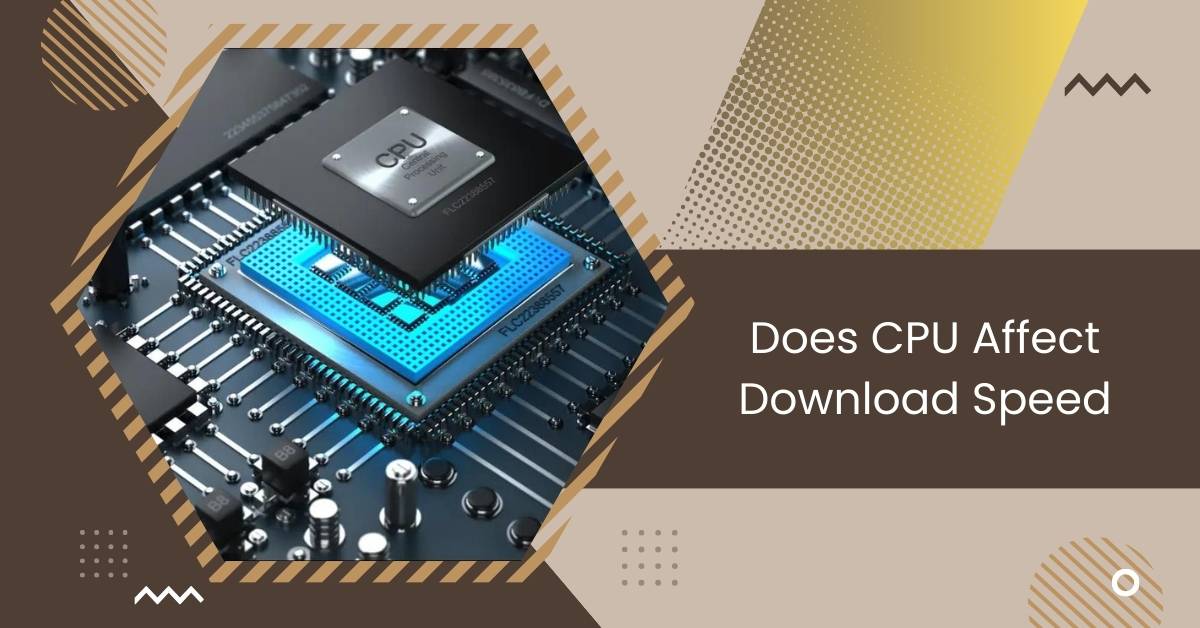In the digital age, where speed is of the essence, the performance of our electronic devices plays a crucial role in our daily lives.
No, CPU speed doesn’t directly affect download speed. While CPU affects various aspects of performance, download speeds are primarily determined by bandwidth and network congestion.
This article will discuss the following: “Does CPU Affect Download Speed?”
What does a CPU do?
The CPU is like the brain of your computer. It does all the thinking and makes sure everything runs smoothly.
Your CPU makes it work whether you use Windows, macOS, or Linux. It has parts called cores and threads that do tasks quickly.
The better the CPU, the faster it works. Some CPUs are made for gaming, so they can handle hard jobs without slowing down.
You can find CPUs made by AMD, Intel, Qualcomm, and Apple. The CPU sits in your computer’s motherboard and talks to other parts to make them work.
How are download speeds affected by CPUs?

Download speeds can be affected by CPUs, which are like the brains of your device. If your CPU is slow or weak, it might struggle to process data quickly, making downloads slower.
But if you have a powerful CPU, it can handle tasks faster, which might speed up your downloads. It’s like having a fast runner instead of a slow one in a race – the faster one gets to the finish line quicker.
So, what does affect download speeds?
Several factors affect download speeds, such as the strength of your internet connection, the quality of your Wi-Fi signal, and the capabilities of your device’s CPU.
If your internet is slow or your device’s CPU is weak, it can slow down how fast you can download things.
How Does Processor Speed Affect Internet Speed?
The speed of your processor, which is like the engine of your computer, can affect how fast you can do things on the internet.
If your processor is slow, loading web pages or downloading files might take longer. But if you have a fast processor, things can happen quicker.
Read: CPU Userbenchmark Bias – Investigate CPU Test Equality!
Yes, the Processor Speed Matters—Somewhat
Yes, the speed of your computer’s processor does matter, but it’s not the only thing that affects how fast you can do things.
A fast processor can help things run smoothly, like opening programs or loading web pages, but other factors like internet speed and the amount of memory your computer has also play a role.
Does a PC Component Increase Download Speed Too?
Certainly, certain PC components can contribute to faster download speeds, but it’s not solely dependent on one component.
Factors like the CPU, network adapter, and RAM can all play a role. A better CPU can process data more efficiently, while a high-quality network adapter can improve connection stability for faster downloads.
Factors Besides Processor Speed Matter Too

1. The Network Interface Card
The Network Interface Card, or NIC, is like the link between your computer and the internet. It helps your computer communicate with other devices on the network, ensuring a smooth and stable connection.
2. Random Access Memory (RAM)
The amount of RAM in your computer or tablet can affect how fast it feels when you’re online. More RAM means your device can switch between tasks faster.
For most people, 2 MB of RAM is enough unless you have a gamer who needs more for fancy graphics. RAM helps your device handle data after it’s downloaded.
While more RAM won’t make your internet faster, it can make your device run smoother, especially when doing lots of things simultaneously.
RAM is important for how well your device works overall, but it doesn’t directly make your internet faster.
Read: Why Is My CPU Usage So Low While Gaming: Fix Issues – 2024
3. The Router
To check if your router might be slowing down your internet, try two-speed tests: one with the router on and another with it off but connected directly with an ethernet cable.
If there’s a big difference, your router could be the issue. Newer routers can handle up to 5 GHz and up to 9,600 Mbps. If your router is older than 2014, it might be time to upgrade.
4. Processor Clock Speed
The processor clock speed, measured in gigahertz (GHz), shows how fast the CPU works. A higher clock speed means the CPU can do more operations per second, making tasks faster.
However, other things like the number of cores, cache size, and CPU architecture also affect the computer’s speed.
What is a good processor speed for a laptop?
A good processor speed for a laptop depends on what you’re using it for. A processor speed of around 2.5 to 3.5 GHz should be fine for basic tasks like web browsing and word processing. But you might want a faster processor, around 4 to 5 GHz, for gaming or video editing tasks.
Does Low CPU Affect Internet Speed?
Yes, a low CPU can affect internet speed because it might struggle to process data quickly. If your CPU is slow, it can slow down how fast you can do things online, like loading web pages or streaming videos.
1. Steps in the Process
Internet speed depends on server speed, connection to your provider, internet speed, and your computer’s network card.
Then, your browser processes the website code. Simple sites need less power, but complex ones, like those with Java code, can use your computer’s resources after loading.
2. CPU Speed
The more information a website needs to process, the more your CPU will render the site. For example, a video streaming site requests that your CPU render text, decode the video, and display it.
A slow CPU will need help to display media-rich sites or to render several different pages simultaneously — if you’re using several tabs in your browser, for example.
3. Memory Leaks
Websites or browser parts can cause memory leaks using your computer’s processor resources. Memory leaks happen when the code doesn’t release memory after using it but keeps asking for more.
You can check for leaks in your computer’s task manager, like in Windows (Ctrl+Shift+Esc), by watching the memory number for your browser in the Processes tab.
4. Optimizing and Troubleshooting
To speed up your internet browsing, limit the number of open tabs, keep your browser and add-ons updated, occasionally restart your browser, turn off unused extensions or plugins, and find alternative sites if one is slowing you down. A slow CPU affects your browsing experience.
Read: CPU Speed 1.1 GHz – Exploring Its Impact On Performance!
CPU Bottlenecking Download Speeds?

Are you wondering if your CPU affects your download speed? It’s a common question. Let’s explore how your CPU and other components can impact how fast you can download files.
CPU – Does Internet speed depends on processor?
Have you ever wondered if your internet speed relies on your CPU? Let’s unravel this question and understand your processor’s role in determining how fast you can browse the web.
Does processor effects the downloading speed?
Are you curious? Does your processor influence download speed? We’ll dig into how your CPU and other factors can affect how quickly you can download files.
CPU speed + Internet download speed (question)
Does your CPU speed affect your internet download speed? Let’s investigate this question and see how your CPU might impact your downloading experience.
Does CPU (and other components as well) affect download speed?
Are you experiencing slow download speeds and wondering if your CPU is to blame? Let’s examine how your CPU, along with other components, could be affecting your download speed.
Read: Baldur’s Gate 3 High CPU Usage – Fix Issues Like A Pro!
High CPU usage when Steam is downloading games
Are you experiencing high CPU usage when downloading games on Steam? Let’s explore why this might happen and what you can do about it.
Does a low end CPU and low RAM affect Steam download rate?
Are you noticing slow download rates on Steam, especially with a low-end CPU and low RAM? Let’s discuss how these hardware limitations can impact your download speed on the platform.
Read: CPU Usage Drops When I Open Task Manager – Ultimate Guide!
Does HDD/CPU Speed Affect BitTorrent Download Speeds?
The speed of your CPU matters for downloads. It has to work hard to check every tiny bit you download and manage many connections.
To help if your CPU is slow, go to Options in Azureus and choose Files -> Performance Options. You can adjust settings to be nicer to your CPU.
Is my download speed being capped by my old CPU?
Yes, an old CPU can slow down your download speed, especially if it’s overloaded with tasks. However, internet connection quality and network hardware also significantly affect download speeds.
What affects game download speeds?
Game download speeds are affected by your internet connection quality, the speed provided by your ISP, the performance of your network hardware (like your router and modem), and the current traffic on the network.
What is a good processor speed for laptop?
A good laptop processor speed is typically between 3.0 and 4.0 GHz. This range provides enough power for most tasks, including web browsing, streaming, and light gaming. For more demanding tasks, look for speeds above 4.0 GHz.
Does CPU (other components as well) affect download speed?
Yes, the CPU can affect download speed, especially if it’s overloaded with tasks. However, other components like your internet connection, modem, router, and network traffic also significantly determine download speed.
Does the CPU or other components affect download speed?
Yes, both the CPU and other components affect download speed. While the CPU handles data processing, your internet connection, modem, router, and network traffic also play crucial roles in determining how fast downloads happen.
Does a low end cpu and low ram affect steam download rate?
Yes, a low-end CPU and low RAM can affect your Steam download rate. If your CPU is slow and you need more RAM, your computer may struggle to handle the download efficiently, leading to slower speeds.
CPU spikes and fluctuating internet speed
CPU spikes can cause fluctuating internet speeds. When overloaded, your CPU struggles to process network data efficiently, leading to inconsistent download and upload speeds. This can result in a less stable internet connection.
Does GPU affect download speed?
No, the GPU does not affect download speed. Download speed is mainly influenced by your internet connection, CPU, and network hardware, such as your modem and router. The GPU is responsible for graphics processing and doesn’t impact data transfer rates.
Does RAM affect internet speed?
Yes, RAM can affect internet speed. If your computer doesn’t have enough RAM, it can struggle to handle multiple tasks, including managing network data, which can slow down your internet speed. More RAM helps ensure smoother performance.
Does CPU affect download speed on laptop
Yes, the CPU can affect the download speed on a laptop. If the CPU is slow or overloaded with tasks, it may struggle to process data efficiently, leading to slower download speeds.
What affects download speed
Factors like internet connection quality, network hardware performance (like your router), current network traffic, and the capability of your device’s CPU can all affect download speed.
Does a better CPU increase speed?
Yes, a better CPU can increase speed, especially for tasks that require processing power. It can lead to faster application performance, multitasking, and overall system responsiveness.
Can your CPU bottleneck your internet speed?
Yes, your CPU can bottleneck your internet speed. If your CPU is overwhelmed with tasks, it may need help to process incoming data efficiently, leading to slower internet speeds despite having a fast connection.
Can a CPU limit download speed?
Yes, a CPU can limit download speed. Suppose the CPU needs to be more robust to handle the processing demands of incoming data. In that case, it can slow down the overall download speed, especially when multitasking or running other intensive applications.
What increases download speed?
- Internet Connection: Upgrading to a faster internet plan can boost download speeds.
- Network Hardware: Using high-quality routers and modems can improve data transfer rates.
- CPU Performance: A speedier CPU can quickly process data, enhancing download speeds.
What is bottlenecking my download speed?
Your download speed may be bottlenecked by factors like your internet connection quality, network hardware performance, and the capability of your device’s CPU. Addressing these issues can help improve download speeds.
What is a OK download speed?
An OK download speed typically depends on your specific needs and usage. However, a download speed of around 25 Mbps or higher is generally considered satisfactory for activities like browsing the web, streaming videos in standard definition, and downloading files.
Is 70 a good download speed?
Yes, a download speed of 70 Mbps is considered quite good. With this speed, you can easily handle activities like streaming high-definition videos, online gaming, and downloading large files with minimal lag or buffering.
FAQs
1. What PC parts affect download speed?
PC parts affecting download speed: CPU, RAM, network adapter, and hard drive speed can all impact download performance.
2. Can a bad CPU affect internet speed?
A good CPU can slow down internet speed if it needs help to process data efficiently.
3. Does CPU affect speed?
CPU speed directly affects how quickly your computer can perform tasks, including downloading.
4. Does RAM increase download speed?
RAM can indirectly increase download speed by allowing your computer to handle more data efficiently.
5. Why is my PC downloading so slow when I have fast internet?
Slow downloads with fast internet may be due to network congestion, device limitations, or server issues.
6. Why does my PC not get good download speed?
Poor download speed on your PC could be caused by various factors such as network congestion, hardware limitations, or software issues.
7. Does processor affect internet speed in mobile?
Yes, the processor in a mobile device can affect internet speed. A faster processor can handle data more efficiently, leading to faster browsing and downloading speeds.
8. CPU usage is high, internet slow, all fine in safe mode
If your CPU usage is high and your internet is slow, but everything seems fine in safe mode, a software issue may be causing the problem.
Conclusion
In conclusion, while the CPU plays a role in overall system performance, its direct impact on download speed is limited. Various factors collectively influence download speeds, such as network connection, hardware components, and software configurations.
Read More
- GPU And CPU Not At 100 But Low Fps – A Detailed Overview!
- Is Cod CPU Or GPU Intensive – Complete Overview – 2024
- Is 60 Degrees Celsius Hot For A CPU – Ultimate Guide – 2024!

Hi everyone, Johns Jack here, your approachable tech aficionado! I’m passionate about CPUs and thrive on keeping up with the newest tech developments. Join me as we delve into the dynamic realm of technology! Visit: Techy Impacts

